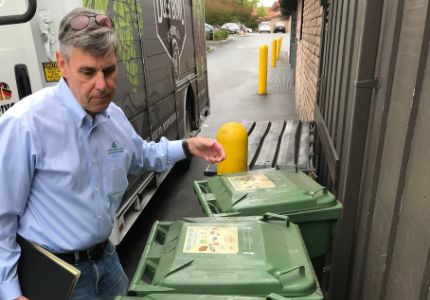Jurisdiction Enforcement
Effective January 1, 2022, jurisdictions must comply with SB 1383 implementation requirements, including:
- Enacting an enforcement ordinance and
- Adopting other enforceable mechanisms according to the law.
(14 CCR sections 18981.1 – 18998.4)
Jurisdictions must begin enforcement of SB 1383 compliant programs on or before January 1, 2024.
(14 CCR section 18995)
Between January 1, 2022, and December 31, 2023, SB 1383 regulations required jurisdictions to:
- Identify regulated entities in violation of this law and
- Provide them with educational materials describing the requirements they are violating [14 CCR section 18995.1(a)(4)].
This process helped ensure generators and other entities had an opportunity to comply before mandatory jurisdiction enforcement went into effect January 1, 2024.
Jurisdictions must have begun enforcing SB 1383 programs on or before January 1, 2024. The enforcement process includes:
- A notification to the entities and
- A deadline to comply prior to jurisdictions assessing penalties and fines for continuous violations.
[14 CCR section 18995.1(a)(5)]
Inspections and Monitoring
Jurisdictions must conduct inspections and monitor for compliance. Jurisdictions may identify a designee to fulfill these obligations.
(14 CCR section 18981.2)
As of January 1, 2022, requirements for all jurisdictions subject to 14 CCR sections 18984 – 18984.14
Conduct an annual compliance review of commercial businesses
Conduct an annual compliance review of commercial businesses (including multi-family dwellings of five units or more) generating two cubic yards or more of solid waste (trash, recycling, and organics) per week [pursuant to 14 CCR section 18995.1(a)(1)(A)].
- This can be a paper audit to verify:
- They provide service or
- They comply through self-hauling or backhauling.
- Jurisdictions providing businesses single, unsegregated collection service must also verify that the contents go to a high-diversion, organic waste processing facility.
- Jurisdictions conducted similar compliance reviews as a requirement of AB 1826, Mandatory Commercial Organics Recycling (MORe).
Conduct route reviews or waste evaluations
Conduct route reviews or waste evaluations [per 14 CCR section 18995.1(a)(1)(A)2] when providing 3+, 3, or 2-container collection services.
- Route Reviews – Annual visual inspections of randomly selected containers for contamination on all collection routes (not required to open bags containing material).
- Notify all generators on the sampled hauler routes and
- Provide education on proper material separation
- Waste Evaluations –Conduct waste evaluations at least twice a year in two distinct seasons of the year [per 14 CCR section 18984.5(c)]. If more than 25% contamination is found in any container type, either:
- Notify all generators on the sampled hauler routes and
- Provide education on proper material separation
- OR
- Perform a targeted route review of containers on the routes to determine sources of contamination.
- Then notify and provide education to those generating contamination.
Jurisdictions must meet the minimum requirements but may also implement more stringent requirements including fines and/or penalties for contamination.
Requirements for ALL jurisdictions
Conduct inspections of commercial edible food generators
Conduct inspections of Tier One and Tier Two commercial edible food generators (per 14 CCR section 18995.1) to determine compliance with the law (14 CCR sections 18991.1 – 18991.5).
Examples of inspection activities include:
- Verifying generators have a written contract or agreement with:
- A food recovery organization or
- A service that collects or accepts edible food.
- Verifying generators are maintaining required records.
- Verifying generators are
- Recovering the maximum amount of edible food that would otherwise be disposed of and
- Not intentionally spoiling edible food.
Conduct inspections of food recovery organizations and services
Verify that food recovery organizations and services with written contracts or agreements to collect or receive edible food directly from commercial edible food generators are maintaining required records [per 14 CCR section 18995.1(a)(2)].
Investigate complaints
Investigate complaints of alleged violations (per 14 CCR section 18995.3).
Jurisdictions must conduct enough route reviews and inspections to determine overall compliance with the regulations [per 14 CCR section 18995.1(b)].
For additional information on jurisdiction inspections, see program examples on the SB 1383 Education and Outreach Resources webpage.
Local Education Agency or Non-Local Entity
Local education agencies and non-local entities have waste collection and edible food recovery, as applicable, enforced by CalRecycle, not the local government.
If a local education agency or non-local entity is not complying with the organic waste or edible food recovery requirements, the jurisdiction is asked to:
- Make note in its recordkeeping and
- Inform CalRecycle by using the Recycling Services and Edible Food Collection complaint form
- Or contacting a Local Assistance and Market Development representative.

Recordkeeping
Jurisdictions must maintain all documentation of inspections and enforcement in the Implementation Record, including:
- Information and documents related to compliance with container contamination minimization requirements.
- Copies of all documentation of route reviews, compliance reviews, and inspections.
- Copies of all enforcement actions, including Notices of Violation and penalty orders.
- A list of the date(s) the jurisdiction determined an entity complied with a Notice of Violation and the evidence supporting the compliance determination.
- Copies of notices and educational material provided.
- All records of enforcement actions taken (14 CCR, Division 7, Chapter 12).
(14 CCR sections 18984.6, 18995.1, and 18995.2)
Written or electronic records generated for each inspection, route review, and compliance review shall include, at a minimum:
- Identifying information for the subject or subjects of the inspection, route review or compliance review, such as, but not limited to:
- The name or account name of each person or entity.
- A description of the hauler route and addresses covered by a route review.
- A list of accounts reviewed for each compliance review.
- The date or dates the inspection, route review, or compliance review was conducted.
- The names of whomever conducted the action.
- The jurisdiction’s findings regarding compliance, including any Notices of Violation or educational materials issued.
- Any relevant evidence supporting the findings, such as, but not limited to, photographs and account records.
- Route review records shall also include a description of the locations of the route review(s) and the addresses where prohibited container contaminants are found, if any.
[per 14 CCR section 18995.1(c)]
CalRecycle developed optional resources to assist jurisdictions in meeting Implementation Record and recordkeeping requirements:
Enforcement Process
Jurisdiction enforcement must be consistent with the law (14 CCR section 18995.4).
Violations of container contamination [14 CCR section 18984.5(a)] are exceptions. Jurisdictions must enforce through route review or waste evaluation notices.
When a jurisdiction determines a violation, other than contamination, has occurred, the jurisdiction is required to, at a minimum:
- Issue a Notice of Violation to the entity requiring compliance within 60 days of the issuance of that notice.
- Commence an action to impose penalties, if the generator has not complied within 60 days from when the Notice of Violation was issued (14 CCR sections 18997.1 – 18997.6).
- The jurisdiction may extend the compliance deadline if the jurisdiction finds extenuating circumstances beyond the control of the entity make compliance with the 60-day deadline impracticable.
Extenuating circumstances include:
- Acts of God, such as earthquakes, wildfires, flooding, and other emergencies or natural disasters.
- Delays in obtaining discretionary permits or other government agency approvals.
- Deficiencies in organic waste recycling capacity infrastructure or edible food recovery capacity if the jurisdiction is under a Corrective Action Plan (pursuant to 14 CCR section 18996.2).
For additional information on jurisdiction enforcement, see program examples on our SB 1383 Education and Outreach Resources webpage.
Penalties
14 CCR section 18997.2 requires jurisdictions to impose the following penalties:
- $50 – $100 per violation for the first violation
- $100 – $200 per violation if the entity is found in violation a second time for the same violation within one year of the first levied penalty
- $250 – $500 per violation if the entity is found in violation for any additional violations of the same section within one year of the most recent penalty
In addition to penalties, jurisdictions may also take actions, such as revoking, suspending, or denying a:
- Permit
- Registration
- License or
- Other authorization consistent with local requirements.
As with all SB 1383 regulations, jurisdictions must meet the minimum requirements, but may also implement additional, more stringent requirements.

For more information contact: Short-Lived Climate Pollutants (SLCP), Organic Waste Methane Emissions Reductions, SLCP.organics@calrecycle.ca.gov

